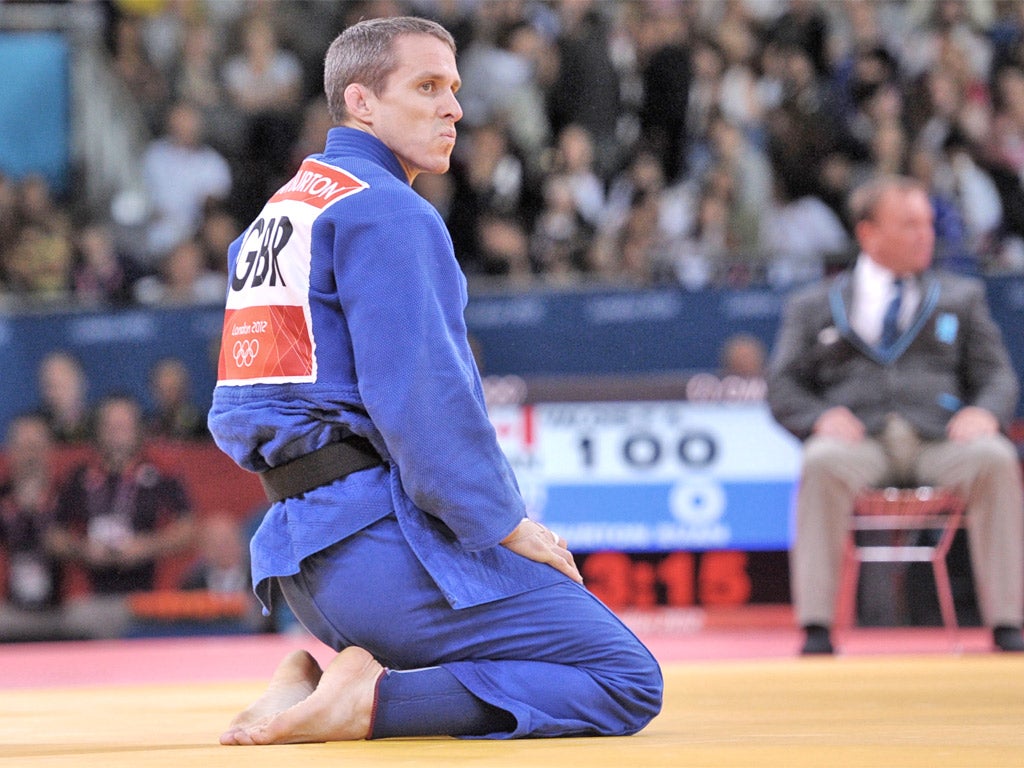Chris Hewett: Gone for a Burton but Euan deserves a medal for honesty after defeat
The critic without a ticket: He listed all those he felt he had let down – only the dog, cat and goldfish were spared a mention

When it comes to the hand-to-hand fighting sports, among which we cannot properly include sailing, even though Ben Ainslie occasionally behaves like a modern-day Blackbeard, the British struggle to punch or grapple their way out of a wet paper bag. There are five such disciplines in the Olympics – boxing, martial arts times two, wrestling ditto – and in three of them, post-war honours have been as rare as rocking-horse droppings.
Greco-Roman wrestling medals? That'll be a zero, a zilch, a nada. Freestyle wrestling? There have been only a couple of bronzes: the last, for Noel Loban in Los Angeles close to 30 years ago; the most interesting, for Kenneth Richmond in Helsinki in 1952. Richmond was best known for striking the gong at the start of movies produced by the studio of J Arthur Rank. If he had armed himself with his mallet, he might have won gold.
Britain has much more of a tradition in boxing: there are plenty of people alive in these islands who remember Dick McTaggart from the 1950s and many more who treasure memories of Chris Finnegan and Alan Minter. Not to mention James DeGale, Amir Khan and Audley Harrison of recent vintage, although fight followers despised the latter so profoundly when he turned professional after his super-heavyweight triumph in Sydney a dozen years ago that they rechristened him "Fraudley" Harrison – or, more damagingly still, "Audrey" Harrison.
But a clear majority of the many glittering prizes secured by British pugilists in the ring were of the pre-war variety. Indeed, were it not for a very substantial haul in the London Games of 1908, when local scrappers fought largely among themselves for want of opponents from other countries, the cupboard would look significantly less well-stocked (standards were some way short of stratospheric back then: when two home-grown Fredericks, Messrs Grace and Spiller, contested the lightweight final, they entertained their audience by missing with simultaneous haymakers and falling flat on their respective faces, like prototype Norman Wisdoms).
There are those students of ringcraft – not least Lennox Lewis, who struck super-heavyweight gold while fighting under the Canadian flag in Seoul before switching allegiance to Britain and embarking on one of the great professional careers of recent times – who believe the home boxers will leave a serious mark on this current competition. They may turn out to be right, but even though the hooking and uppercutting has been going on a while now, the number of byes granted to contestants in the early rounds means the tournament has yet to take shape.
To the judo, then, via the BBC's extraordinarily comprehensive internet service, where nothing, but nothing, happens without full coverage – generally in triplicate. The world of the yuko (a three-point score) and the ippon (which carries 10 points and automatic victory), not to mention the sasae-tsurikome-goshi, the ko-uchi-maki-komi and the kuzure-kami-shiho-gatame (a pull-throw foot sweep, a minor inner wrap-around throw and a variant on the upper four-quarters hold: come on, catch up!) may be a touch on the esoteric side, but if watching some of this action stops the village hardnut taking a swing at someone in the pub for fear of picking on the wrong bloke, it more than pays its debt to society.
British judoka males have had a lean time of it since the 1970s, when Brian Jacks and David Starbrook were a force to be reckoned with, and the 1980s, when Neil Adams was in his pyjama'd pomp. The women have been more competitive of late – Sharon Rendle, Nicola Fairbrother, Kate Howey – but fears of another poor Olympics here look to have been well-founded. At the start of yesterday's session, only Colin Oakes had actually won a fight. Neither Gemma Howell nor Euan Burton were able to stop the rot.
Howell, another beneficiary of combat sport's bye system, found herself entangled with Gevrise Emane of France – not so much a handful as an armful, given her status as reigning world champion. Howell duly tipped Emane apex over base with an illegal leg wrap, which was not obviously different to any other kind of leg wrap as far as the uninitiated were concerned, and was duly disqualified by the men in suits (as opposed to men in nightwear). Burton, meanwhile, lasted less than two minutes against Antoine Valois-Fortier of Canada, an opponent armed with a name like a fine burgundy and a grip like a vice.
Burton was almost beside himself with grief. After listing all those he felt he had let down – only the dog, the cat and the goldfish were spared a mention – he said: "I've been working for this for a quarter of a century and, as I'm pretty sure you won't see me in Rio in four years' time, there are no positives to take from this." At last! A defeated sportsman who sees only negatives! He deserves a medal, simply for being honest.
Just as the increasingly impressive Ian Thorpe, human fish turned authoritative pundit, deserves a medal – another one – for taking the Americans to task for wondering in public if the Chinese teenager Ye Shiwen's jaw-dropping swim in the women's 400m medley might have been chemically assisted. Thorpe suggested that no such questions would have been raised had a Team GB swimmer shaved whole seconds off her time. "We have to take the nationality out of this," he said. Quite so.
Join our commenting forum
Join thought-provoking conversations, follow other Independent readers and see their replies
Comments
Bookmark popover
Removed from bookmarks